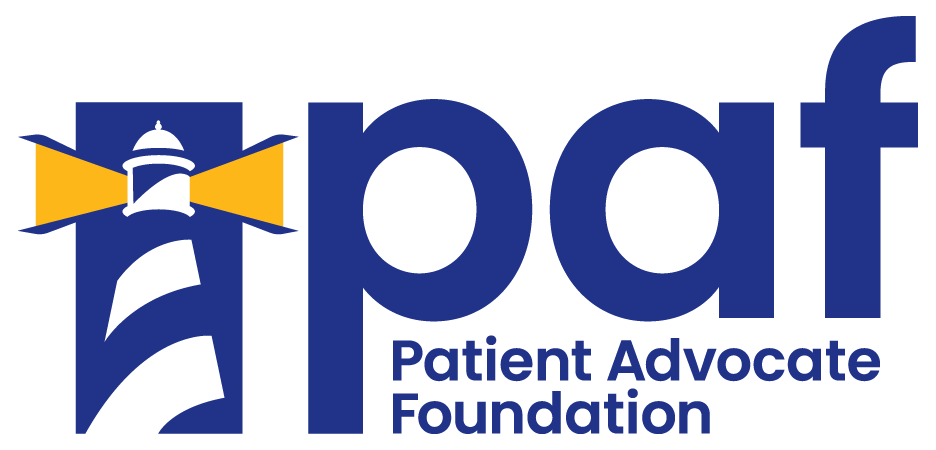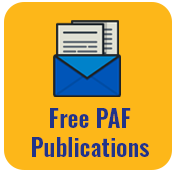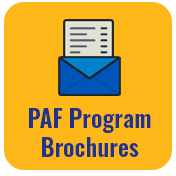Patient Advocate Foundation Case Management Program Disclaimer
Patient Advocate Foundation Case Management Disclaimer
Please read this disclaimer carefully. It explains these things about Patient Advocate Foundation (PAF) Case Management:
- Case Management services. This is what PAF can do to help you resolve certain issues related to a serious health condition.
- Program requirements. These are the rules that say who can get help from PAF Case Management.
- Patient privacy. This describes how PAF protects the personal information you share with us.
Key points about PAF Case Management
- PAF Case Management services include helping you get prescribed medical treatment and helping you find ways to pay for treatment and living expenses.
- To get PAF Case Management services, you must be in, just starting or have been in treatment for a serious health condition.
- To help you with support and services, PAF case managers ask you for personal information about your health condition and treatment. You share this information voluntarily. PAF uses the information only with your permission.
For more information
- About PAF Case Management: Call 800-532-5274.
- About PAF’s Patient Privacy Policy: Visit https://www.patientadvocate.org/privacy-policy/
- Case Management services
PAF’s Case Management provides free, one-on-one support to patients, families and caregivers to help you manage challenges related to a serious medical condition. Our case managers can help you sign up for programs and services offered by organizations like charities and government agencies that can help you with:
- Paying for living expenses. This includes, but is not limited to, helping you:
- Apply for programs that can help pay for things like food, rent, electricity, and transportation
- Get discounts or set up payment plans for these things
- Access to care. This means getting medical care and treatment you need. It includes, but is not limited to:
- Getting treatment and services
- Helping you understand what your health insurance covers, including treatment options, second opinions, and referrals to other providers
- Helping you understand your insurance options if you’re not insured
- Paying for treatment. This means helping you find ways to pay for your health care costs. This may include, but is not limited to:
- Getting approvals and payments from your health insurance
- Appealing (asking for review of) insurance denials
- Applying for government programs, like Social Security Disability Insurance (SSDI) and the Medicare Low Income Subsidy (LIS)
- Applying to programs that help pay for your co-payments, co-insurance, or health insurance premiums
- Employment. This includes, but is not limited to:
- Helping you understand your rights under the Americans with Disabilities Act (ADA) and the Family and Medical Leave Act (FMLA)
- Getting disability insurance to help with income if you can’t work because of a medical condition. Checking with your employer to see if you have this insurance.
PAF Case Management assistance is provided on a first come, first serve basis to the extent the program has capacity to provide assistance. You receive PAF Case Management services until we resolve your healthcare issues as best we can or you no longer need or want services from PAF. PAF provides these services as long as we have money to support them.
- Program requirements
To get services from PAF Case Management, you must:
- Have a confirmed diagnosis of a serious health condition. Or you're being tested for the health condition.
- Be in active treatment for the health condition or starting treatment for the condition in the next 60 days. Or you must have finished treatment in the last 6 months.
- Be a U.S. citizen or permanent resident of the U.S.
- Be getting treatment in the United States or a U.S. territory
When reviewing your information to make sure you meet program requirements, PAF does not make decisions based on:
- Your healthcare or service provider
- Drug therapies, services, supplies, or suppliers you use
- Who referred you to PAF Case Management
- A relationship you have with or a referral from any PAF donor
You can change your providers, treatments or services at any time. They don’t affect your being in the program.
- Patient privacy
PAF is committed to protecting your personal information. As part of PAF Case Management, you share things about yourself and your health with us. We keep your information safe and private.
PAF may use your information to provide services to you only with your permission or permission from your chosen representative. This can be a family member, care giver or legal guardian. To identify your chosen representative to PAF:
- You can identify them on your first call to PAF Case Management.
- Your representative can make the first call to PAF Case Management for you.
You or your representative may give permission to others to share your information with PAF. For example:
- You may ask a healthcare or service provider to contact and work with PAF for you. When you do this, you give the provider permission to share your information with PAF.
- You and your PAF Case Manager may talk directly to someone from an organization about an issue you’re working to resolve. As you’re on the phone together, you give permission for the organization and PAF to share your information.
PAF may ask for these kinds of information:
- Individually identifiable information. This is information, that is just about you. For example, your name, birthday and Social Security Number are kinds of individually identifiable information.
- Protected health information. This is individually identifiable information that’s about your health. It includes things like your health condition; your healthcare provider and health insurance; and treatments and services you’ve received and payments for them.
- Contact information. This includes your mailing and email addresses and your phone number.
You or your representative give this information voluntarily (not forced) to PAF. The information can come from you, your chosen representative, or providers, including:
- Healthcare providers, healthcare settings, labs, pharmacies, and medical equipment providers
- Government health and welfare plans and programs
- Other assistance programs (not government)
- Insurance companies
- Employers and benefit managers
- Lenders, including banks and credit companies
- Utility services, like water and electricity
- Communication Assistance
We provide free communication aids and services to anyone with a disability or who needs language assistance. We do not discriminate on the basis of race, color, national origin, sex, gender identity, age, sexual orientation, health status or disability. To receive language translation assistance free of charge, please call us at 1-800-532-5274 and select Option 2. To receive communication assistance, dial 711 and provide the TTY relay service with the following number 1-800-532-5274, Option 2.
If you believe we have failed to provide reasonable accommodation, or think we have discriminated in another way, contact us to file a grievance.
Compliance Coordinator
421 Butler Farm Road
Hampton, VA 23666
Phone: 757-952-0589
To receive communication assistance, dial 711 and provide the TTY relay service with the following number: 757-952-0589
Email: compliance@patientadvocate.org
You may file a civil rights complaint with the U.S. Department of Health and Human Servies, Office for Civil Rights, at:
U.S. Department of Health and Human Services
200 Independence Avenue SW
Room 509F, HHH Building 1019
Washington, DC 20201
Phone: 800-368-1019
TTY/TDD: 800-537-7697
Complaint Portal: U.S. Department of Health & Human Services - Office for Civil Rights (hhs.gov)
Complaint Process: Complaint Process | HHS.gov
Here’s how PAF may use your information:
- PAF representatives may use your personal information to:
- Provide services and support to you as part of PAF Case Management. PAF may offer these on its own or may partner (work) with other organizations.
- Contact other organizations and services to help resolve the issues you're asking PAF for help with
- Evaluate PAF Case Management to make sure it's helpful to patients
- Respond to requests for patient records as required by law
PAF representatives can include:
- All PAF employees
- PAF Directors and Officers
Staff of partner and service provider organizations who work with PAF to provide case management and other patient programs and services
- PAF may send you information by mail, email or phone while we're working with you and after your issue is resolved. This information may be about PAF programs, events, research and fundraising. To remove your name from our mailing list, call 800-532-5274.
- PAF may use your information in certain reports, including research reports, that review patient needs and program success. These are called de-identified reports. This means they include information from many patients and do not identify individual patients. They do not include things like patient name or identification (ID) number.
- PAF will not sell or rent your personal information, including your protected health information, to anyone.
- PAF will not share your personal information with anyone from another organization unless it’s:
- Needed to resolve an issue that you’ve asked for help with
- Needed as part of an application for another assistance program
- Used to assess PAF Case Management success
- Required by a PAF partner organization
- Required by law






